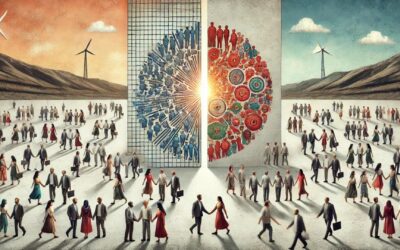Introduction
Explore the possibility of a world without war and its potential positive impact on our lives and society. Learn about the direct and indirect benefits of abolishing war, including increased investment in healthcare and education, greater cooperation between nations, and new opportunities for personal growth. Follow a conversation with Gandhi, as he shares his thoughts on the pursuit of peace, the power of nonviolence, and the importance of holding onto our dreams and ideals.
How a World Without War Could Transform Our Lives
Despite the prevalence of wars throughout history, it is possible to imagine a world without war. Far from being a utopian dream, this potential reality could have an immensely positive impact on our lives and society as a whole. In this article, we will explore what a world without war could look like, and how it would affect our lives.
The first thing to consider is the direct impacts of abolishing war. It goes without saying that one of the most obvious effects would be an end to the loss of life and destruction caused by armed conflict. This alone should be reason enough for us all to hope for peace – no more families torn apart due to death or injury; no more cities left in ruins after bombardment; no more refugees fleeing their homes in search of safety elsewhere.
But there are also indirect benefits from ending wars which must not be overlooked. With so much money spent on military budgets each year, cutting back on these costs could free up resources for other important areas such as healthcare, education and infrastructure development. Increased investment in these sectors can have a lasting positive effect on both individuals’ quality of life and society as a whole over time – something which cannot be said about spending vast sums on weapons systems or training soldiers!
Furthermore, removing the threat posed by hostile nations may encourage greater cooperation between countries around the world when it comes to tackling global challenges such as climate change or poverty reduction. Without fear of attack from another nation-state, governments can focus their efforts towards solving shared problems instead of diverting attention away from them into military operations with uncertain outcomes at best (and disastrous ones at worst).
On an individual level too, living in a peaceful environment presents people with new opportunities they may never have had before: instead of spending years being trained for battle or worrying about potential dangers lurking around every corner, citizens across the globe can invest their time and energy into pursuing personal goals such as furthering their education or launching businesses that benefit society as well as themselves financially. Moreover, with fewer distractions coming from external sources such as political unrest or economic instability caused by warfare – people might even find themselves happier overall!
Of course there are still obstacles standing in our way when it comes to achieving true world peace but this article seeks only to point out some possible advantages if we were able to overcome them eventually – showing how beneficial a ‘world without war’ could potentially be for everyone involved regardless where they come from politically/economically/socially etcetera… So let us continue exploring what else awaits us once we reach this utopian goal…
For instance – having abolished traditional warfare completely – alternative methods may need implementing if disputes between states arise over issues such international borders / trade agreements etc… Diplomacy has been used successfully many times throughout history though its effectiveness relies heavily upon mutual respect & understanding between opposing sides – something not always easy given current tensions worldwide… Nonetheless it remains possible that through increased communication & negotiation rather than violence conflicts can still be resolved peacefully & amicably thus avoiding any unnecessary losses (of either human life or material possessions) whilst simultaneously promoting goodwill among former adversaries who now recognise each other’s rights equally….
On top off all this – a world without war could also bring about greater prosperity for all. With no money being spent on military operations or weapons production, governments could instead divert these funds towards improving infrastructure & public services such as healthcare & education – leading to better living standards across the board. Additionally, with fewer disputes between nations over resources etc there might even be opportunities for increased cooperation in terms of trade/investment which again would benefit everyone involved financially…
Moreover – abolishing warfare may encourage further advances in technology due to an increase in resources available now that they are no longer being used up by military activities. This too can have far-reaching effects not only on our lives but also those of future generations who will inherit a more advanced society than we currently do thanks largely to this newfound access to innovation!
Finally it should be noted that creating a world without war does not necessarily mean eradicating all violence completely (as some conflicts cannot be resolved through diplomatic means). However what is possible is reducing its occurrence significantly thus making people feel safer within their own societies & allowing them to focus more on achieving positive goals rather than protecting themselves from potential harm….
In conclusion then – while it may seem like an impossible dream at times – it is still possible to imagine what life could be like if we were able to abolish wars and create a peaceful environment worldwide. From ending loss of life and destruction caused by armed conflict; freeing up resources for other important sectors such as healthcare and education; encouraging cooperation between countries when tackling global challenges; providing individuals with new opportunities they never had before; promoting economic stability and technological advancement – the benefits of living in such an environment would truly extend beyond anything imaginable today!
Interview with Mahatma Gandhi
Mr. Gandhi, What do you think about the ideas put forth in the article? Do you think only a dreamer may say those things?
I believe that the ideas put forth in this article are not merely the dreams of idealists or dreamers, but rather they reflect a deep yearning for peace that is present in the hearts of people across the world. As someone who dedicated his life to the pursuit of nonviolence and peaceful conflict resolution, I firmly believe that a world without war is not only possible but also essential for the survival and flourishing of humanity.
War only begets more war and perpetuates a cycle of violence and suffering that leaves no winners. The direct and indirect benefits of ending wars are manifold, as outlined in the article, and should be enough to inspire us all to work towards this noble goal. The resources currently being poured into military budgets can be redirected towards meeting the basic needs of people, promoting social welfare, and fostering sustainable development. This, in turn, can contribute to greater stability, prosperity, and cooperation among nations.
Of course, achieving world peace will require significant efforts and sacrifices from all of us. It will require a fundamental shift in our thinking, attitudes, and behaviors towards each other, and a commitment to dialogue, mutual understanding, and compassion. It will require us to recognize and respect the inherent dignity and worth of every human being, regardless of their nationality, ethnicity, or religion.
But as someone who witnessed firsthand the transformative power of nonviolence and the human capacity for change, I am convinced that it is possible to build a world where peace reigns supreme. It will require courage, perseverance, and unwavering faith in the power of love and truth, but it is a goal that is worthy of our collective aspiration and effort.
But although we are all deeply touched by the change you brought, no matter how briefly it lasted, the world has not changed at all. Why should there always be violence?
It is true that the world is still plagued by violence and conflict, and it is a sad reality that wars continue to be fought in many parts of the world. However, we must not lose hope or give up on our pursuit of peace. As I have said before, “We must be the change we wish to see in the world.”
Violence is not an inherent or inevitable part of human nature, but rather it is a result of our choices and actions. We have the power to choose nonviolence and to promote peaceful conflict resolution through dialogue, negotiation, and mutual understanding. We must work to create a culture of peace where differences are celebrated, and conflicts are resolved peacefully.
I also believe that violence is often the result of deeper social, economic, and political injustices that need to be addressed if we want to build a more peaceful world. We need to tackle poverty, inequality, and discrimination in all its forms if we want to create a more just and peaceful society.
In short, the task of creating a world without violence requires a holistic and multifaceted approach that addresses the root causes of violence, promotes a culture of peace, and empowers individuals and communities to become agents of change. It is a long and difficult road, but it is a road worth traveling, for the sake of our own survival and that of future generations.
So, is it useless to dream about a peaceful world? Or is it true that even having an idea that never come to fruition makes that idea exist, while if we don’t hold these dreams and ideas, even our wildest dreams would cease to exist?
It is not useless to dream about a peaceful world. In fact, holding onto these dreams and ideals is crucial to creating a better world for ourselves and future generations. As I have said before, “The difference between what we do and what we are capable of doing would suffice to solve most of the world’s problems.”
The power of our dreams and ideas lies not only in their potential to come to fruition but also in the transformative effect they can have on our own lives and on the world around us. By holding onto these dreams and ideals, we can inspire others to join us in our pursuit of peace and create a ripple effect that can lead to real change.
It is true that not all dreams and ideas will come to fruition, but that does not diminish their value or importance. Even if we do not achieve our ultimate goal of a world without violence, the very act of pursuing it can lead to positive changes and meaningful progress. It is through our dreams and ideals that we can envision a better world and work towards making it a reality.
In short, it is not useless to dream about a peaceful world. On the contrary, it is essential to hold onto these dreams and ideals, as they can inspire us to be the change we want to see in the world and create a better future for all of us.
Is there any situation where you think violence is necessary, Mr. Gandhi?
As a firm believer in nonviolence and peaceful conflict resolution, I did not advocate for violence in any situation. In fact, I believed that violence only begets more violence and perpetuates a cycle of suffering that leaves no winners. I also firmly believed that there is no such thing as a “just” war, as war can never truly solve the underlying causes of conflict and only leads to more bloodshed and destruction.
Instead, I believed in the power of nonviolence as a means of resistance and social change. Nonviolence does not mean passivity or submission, but rather it involves active and creative resistance to injustice and oppression. Through nonviolent resistance, we can appeal to the conscience of those in power, expose the injustice of the system, and mobilize the masses to demand change.
I acknowledge that there may be situations where violence seems like the only option, such as in cases of self-defense or defense of others. However, even in such situations, I believe that violence should be a last resort and only used when all other options have been exhausted. Nonviolence should always be our first option, as it has the potential to bring about lasting and meaningful change without the loss of life and destruction caused by violence.
Thank you Mr. Gandhi for sharing your thoughts with us in English Plus Magazine.
You’re welcome, and it was my pleasure to share my thoughts on this important topic with you. Remember, the pursuit of peace requires the efforts of every individual, and we must work together to create a better world for ourselves and future generations.
Keywords
- prevalence: the fact of being widespread or common
- armed conflict: a situation in which opposing groups or countries fight against each other using weapons
- utopian dream: an idealistic, perfect, and often unrealistic vision or idea of a better future
- positive impact: a beneficial effect on something or someone
- indirect benefits: benefits that are not immediately or directly related to something
- military budgets: the amount of money allocated to fund the military and its activities
- social welfare: programs and services provided by the government to promote the well—being of individuals and communities
- sustainable development: development that meets the needs of the present without compromising the ability of future generations to meet their own needs
- mutual respect: respect that is given and received by two or more parties
- economic stability: a condition in which an economy is stable and not subject to extreme fluctuations or crises
- technological advancement: the development and implementation of new technologies that lead to progress and improvements
- nonviolence: the use of peaceful means, such as dialogue and civil disobedience, to achieve social or political change
- social justice: the idea that all people should have equal rights and opportunities, regardless of their race, gender, religion, or socioeconomic status
- pursuit of peace: the active effort to create a world without violence or conflict
- transformative effect: the ability to create a significant change or impact on something or someone












0 Comments